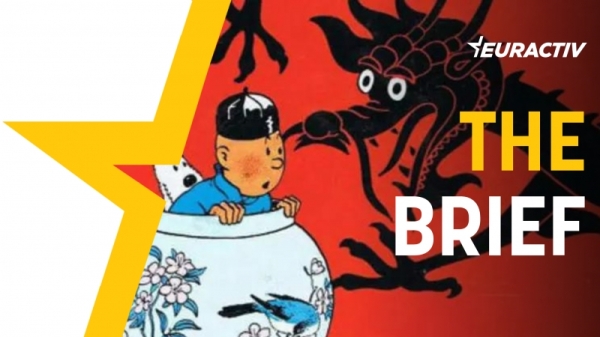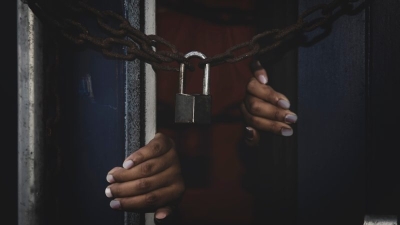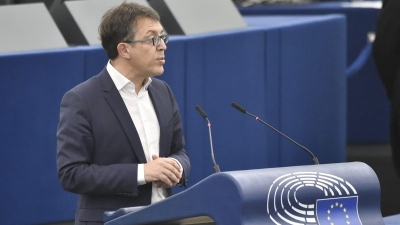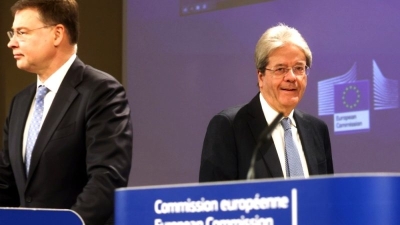The Brief — Tintin in China

French President Emmanuel Macron’s visit to China will start tomorrow (4 April), a high-risk operation that may dent his international stature. But just like Tintin, the globetrotter character of Hergé, Macron will do his best to keep the Chinese dragon away from the evil in Ukraine.
Russia and China are not strictly “allies” – they call their bond a “special and privileged strategic partnership”, but the bottom line is that the two powers are enjoying their best relations since they signed a treaty of friendship in 1950.
While Beijing is unhappy about Russia’s invasion of Ukraine, it has refused to condemn it, repeated Russian propaganda and disinformation about the war, opposed economic sanctions and abstained or sided with Russia in United Nations votes.
China articulated its approach in its 12-point plan on the “settlement of the Ukraine crisis”. Kyiv does not like the plan, starting from its title, as there is no “Ukraine crisis” – just Russian aggression against Ukraine. But the effort by Beijing to achieve a peaceful resolution is not rejected as such.
US President Joe Biden said recently that despite rumours and even publications, there is no evidence that China has sent weapons to Russia to replenish their rapidly diminishing stockpiles.
Sending weapons would be a game-changer, a clear transgression despite all the red lines drawn by the West, and Macron’s visit should probably be seen as an attempt to prevent such a development.
China, the country the US sees as its greatest strategic threat, is the type of power with no friends, merely interests. Russia has everything to gain from having China as an ally, as it could have the upper hand in Ukraine. But it also has everything to lose – by receiving such help, Russia will become China’s vassal, not an ally or a partner.
The key here is China’s interests. Beijing has nothing to gain from Russia losing the war but nothing to gain from Russia winning, either. Russia “winning” in China very much would result in atrocities and “burning the country to the ground”.
China also opposes nuclear proliferation, which may risk South Korea developing its own nuclear arsenal.
Macron, the leader of the EU’s only nuclear power, will arrive in Beijing on the back foot. The French president has failed to mediate with Putin and is weakened at home as he still struggles to push through an unpopular pension reform.
Before him, Spanish Prime Minister Pedro Sánchez reportedly encouraged the Chinese leader to speak to Ukrainian President Volodymyr Zelenskyy but declined to say what Xi said about the issue. Despite expectations, Sánchez’s visit, the first of an EU leader since Russia’s invasion, yielded few concrete results.
The odds are high that Macron will return from China empty-handed, much as Sánchez did. Success would be a commitment by Xi not to send weapons to Ukraine or a first telephone conversation with Zelenskyy.
Macron has already been compared to Tintin by the French press – not a dishonourable comparison, considering Hergé’s character as an archetype of a courageous explorer committed to the fight against evil.
But Tintin is also perceived as somewhat naïve, prone to blunders. The jury is out on whether Macron will fare better.
The Roundup
Finland will officially become a member of the military alliance on Tuesday as foreign ministers gather for their meeting in Brussels, NATO Secretary-General Jens Stoltenberg told reporters on Monday.
The EU’s biomass sustainability rules will apply more loosely in overseas territories like French Guiana to promote economic development there, but the exception inserted in the bloc’s Renewable Energy Directive will lead to increased deforestation, environmentalists say.
European consumers suspect businesses purposefully make products to break down quickly and be unrepairable, and while a new EU-wide “product passport” aims to extend its lifetime and improve recyclability, there are big questions about how it will work.
Russia accused Ukraine on Monday of organising the murder of a prominent war blogger in a St. Petersburg cafe and arrested a young Russian woman who was shown in a police video admitting planting the bomb that killed him and injured over 30 others.
German Chancellor Olaf Scholz visited Romania on Monday to underscore Western support for a key NATO ally that borders Ukraine and also for neighbouring Moldova, which has looked especially vulnerable since Russia’s invasion last year.
Look out for…
- Commission Vice President Valdis Dombrovskis participates via videoconference in G7 Trade Ministers’ Meeting.
- Economy Commissioner Paolo Gentiloni holds virtual meetings with presidents of Insurance Associations of Italy, France and Germany.



